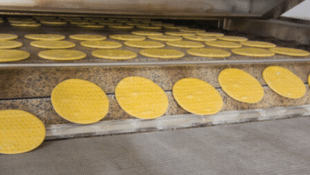5 Ways To A Sustainable Industrial Oven

More energy-efficient baking solutions are within reach for commercial bakers thanks to advances in digitalization and oven burner technology. It’s a welcome sight for an industry that’s committed to achieving net zero carbon emissions by 2050.
Within a bakery’s operations, energy use is most concentrated in either the baking or freezing process. According to the EPA, for non-frozen products, the baking process is the largest energy consumer ranging between 26% to 78% of total energy consumed.
With ovens using such an immense amount of energy, they’re also your greatest opportunity to reduce the environmental impact of your bakery’s operations.
1. Hydrogen Burners: 99.9% less CO2
Hydrogen fuel can be produced from different sources, including fossil fuel, but green hydrogen is made with only renewable sources like solar, wind, or water.
Beyond baking with hydrogen, others are taking note of hydrogen’s possibilities. The European Commission will explore hydrogen to help reduce emissions by at least 55% by 2030. The U.S. government also released its National Clean Hydrogen Strategy and Roadmap to meet national decarbonization goals across different sectors.
AMF Den Boer, an AMF Bakery Systems brand, engineered the first hydrogen-powered oven on the market, the MB-VITA Tunnel Oven. Sourcing green hydrogen, the state-of-the-art oven uses AMF’s patented hydrogen-fueled burners to reduce CO2 emissions by 99.9% throughout the baking process. Available in multiple configurations, the MB-VITA is suited for a wide range of product applications with a modular design for efficient installation and potential expansion for future growth.
AMF’s patented hydrogen burners are also available worldwide as a retrofit solution so your existing oven can be modified with these burners to achieve more sustainable baking.
2. Electric Baking to Reduce Emissions
How does an industrial bakery choose gas vs electric oven technology? Although gas ovens tend to heat more quickly than electric ovens, electric ovens are more energy-efficient compared to their gas counterparts. With increasing legislation requiring industrial bakeries to meet efficiency standards targeted at the reduction of greenhouse gas emissions, electric ovens are increasing in prevalence as they are proven to conserve more energy converting electricity directly into heat. Choosing electricity from renewable sources can help to reduce your bakery’s carbon footprint.
AMF’s team of thermal experts provides analysis and consultation for the conversion of Den Boer, BakeTech, or Vesta gas ovens to electric but also offers electric oven models like the MB-E Tunnel Oven by AMF Den Boer. Electric ovens also utilize more even heat distribution to deliver more consistent product quality.
3. Dual-Fuel Flexibility
You don’t have to choose between fuel sources with the launch of the Hybrid Flynn burners. The innovative burner technology is being integrated into AMF BakeTech Continuous Ovens to combine the benefits of different fuel sources for optimal performance and can help bakeries maintain uptime, especially in regions where natural gas is less accessible or more expensive. Hybrid burners proactively mitigate risk by allowing bakeries to switch heating sources based on the availability and price of gas or electricity. When needing to increase power or shorten oven start-up times, gas fuel can be easily turned on or off, leaving you with just gas, just electric, or both.
AMF Den Boer also provides custom, modular tunnel oven solutions for dual fuel utilizing alternating zones in a single oven featuring multiple heat sources, such as an impingement zone followed by an electric zone to provide consistent baking with reduced energy consumption.
4. Save up to 26% on Natural Gas
Bakeries can drastically reduce their carbon footprint and energy consumption by tracking their oven’s metrics with the Sustainable Oven Service (SOS). This new and innovative service is offered for any AMF thermal brand. Advanced sensors continuously monitor your oven’s performance. Our artificial intelligence data model and team of oven experts then use the data to provide you with expert recommendations to remove inefficiencies and optimize your baking process.
You’ll reduce emissions and waste, save overhead, and get a more consistent and reliable bake. The Sustainable Oven Service helps you know your baking process inside and out, so you can adjust based on facts. All new AMF ovens are now standard equipped with this service.
5. Sustainability through Longevity
Regardless of the fuel source, picking an oven that will last you decades can be more sustainable than constantly replacing ovens. AMF ovens are made to last and often run for 50 years or more. We also offer modular systems that grow with you so your oven can meet your evolving business needs.
Bonus: Retrofitting for Sustainability
If you are not in the market for a new oven, you can also look to repair, modernize, upgrade, expand, or even relocate your existing oven with ThermalCare by AMF. This dream team of industry veteran engineering talent services most brands of industrial proofers, ovens, and coolers to help you streamline your operation, reduce waste, extend machine life, improve product quality, and minimize downtime.
After a consultation and thermal evaluation, our ThermalCare team will determine if your oven is a good fit for an upgrade. Then we will be with you for every step of the process to ensure your familiar oven still delivers familiar results with improved performance.
Contact us for more information.
Related Resources
-

Savory, Sweet, and Smart: The Recipe for Scalable Success in North American Pastry Production
In commercial baking, success hinges on more than just flavor—it demands consistency, compliance, and the ability to scale without compromise. From laminated doughs to protein-rich pastries,…
-

Maximizing Bakery Output with AMF BakeTech’s Continuous Systems
Enhanced production flow, proven durability, and repeatable quality are key to staying ahead in the competitive world of commercial baking. Large-scale industrial bakeries must continually adapt…
-

Nurturing Sustainability in Industrial Baking: A Comprehensive Approach
The baking industry’s sustainability goals can be achieved through a combination of large and small efforts. For an industry as large as commercial baking, even small…